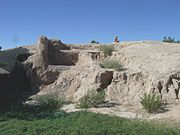Mesa Grande
Mesa Grande | |
 Entrance of the Mesa Grande Cultural Park | |
| Nearest city | Mesa, Arizona |
|---|---|
| Coordinates | 33°26′03″N 111°50′43″W / 33.43415°N 111.845271°W |
| Architectural style | Hohokam |
| NRHP reference No. | 78000549[1] |
| Added to NRHP | November 21, 1978 |
Mesa Grande Cultural Park, in Mesa, Arizona, preserves a group of Hohokam structures constructed during the Classic Period. The ruins were occupied between AD 1100 and 1400 (Pueblo II – Pueblo IV Era) and were a product of the Hohokam civilization that inhabited the Salt River Valley. There the Hohokam constructed an extensive system of water canals. It is one of only two Hohokam mounds remaining in the metro Phoenix area, with the other being the Pueblo Grande Museum Archaeological Park. The site's central feature is a massive ruin of adobe walls and platforms.[2][3]
It was listed on the National Register of Historic Places in 1978[1] when it was owned by B-movie actress Acquanetta and her husband Jack Ross. The site was acquired from them in 1988 by the city of Mesa.[4]
Since the 2013 completion of the Mesa Grande Visitor Center,[5] the site is seasonally open to the public from October through May.[6]
The Mesa Grande Cultural Park is operated by the Arizona Museum of Natural History, which is undertaking archaeological studies there. The mound remains remarkably intact. The general site remains protected but undeveloped.
The ruins are located to the west and across the street from the former Mesa Lutheran Hospital, which became a Banner Health corporate center housing billing and information technology employees.
Artifacts presumably associated with the ruins have been found in the neighborhood to the west. Axe heads, arrow heads, and pottery sherds were regularly uncovered and collected by residents during the 1960s and 1970s just under the surface of the earth in private property there.[citation needed]
Gallery
[edit]-
"Room D", a 1955 excavation by Arizona State University below the main Mesa Grande mound.
-
A member of the Southwest Archaeology Team excavates matrix materials from a test pit.
-
A view of test pits from Station 6 of the north end of the mound.
-
The Mesa Grande Temple Mound. Built by the Hohokam in 1100 AD. The walls are made of “caliche”, the calcium carbonate hardpan that forms under the desert soils. The mound is longer and wider than a modern football field (note: U.S. Football) and is 27 feet high.
-
Different view of the Mesa Grande Tempe Mound.
-
A large plaza in front of the Mesa Grande Temple mound which was enclosed by a large adobe wall.
-
Another view of the plaza.
-
One of the two largest networks of irrigation canals created in the prehistoric Americas by the Hohokam.
-
Replica of the Mesa Grande Hohokam Ballcourt . The ballcourt, which is located at 1000 N. Date St., is an open-air structure where the Hohokam played ballgames using a rubber ball made from a local plant.
See also
[edit]Notes
[edit]- ^ a b "National Register Information System". National Register of Historic Places. National Park Service. April 15, 2008.
- ^ "Flat Stanley at Mesa Grande". Archaeological Research Institute, Arizona State University. Archived from the original on September 14, 2004. Retrieved March 21, 2011.
- ^ "Mesa Grande". City of Mesa. 2002. Archived from the original on July 24, 2012. Retrieved October 13, 2011.
- ^ "Acqua Blues". Phoenix New Times. September 2, 2004. Archived from the original on June 17, 2011. Retrieved August 29, 2011.
- ^ Nelson, Gary (January 18, 2013), "Residents protected Mesa Grande ruins through the years", The Arizona Republic
- ^ Hours of operation can be found here: "Mesa Grande". Archived from the original on July 24, 2012. Retrieved October 13, 2011.
References
[edit]- Groff, Garin (April 22, 2012), "Mesa Grande ruins to open visitors center this fall", East Valley Tribune, retrieved November 2, 2012
- Nelson, Gary (September 4, 2012), "Construction kicks off on center to showcase Mesa Grande site", The Arizona Republic
- Nelson, Gary (January 18, 2013), "The park showcases Mesa Grande, where it is believed the Hohokam civilization once existed", The Arizona Republic
- Sakal, Mike (September 5, 2012), "Officials break ground on long-awaited Mesa Grande Visitors Center", East Valley Tribune, retrieved November 2, 2012
External links
[edit]- Archaeological sites in Arizona
- Archaeological sites on the National Register of Historic Places in Arizona
- Buildings and structures in Mesa, Arizona
- Hohokam
- Native American history of Arizona
- Native American pottery
- Protected areas of Maricopa County, Arizona
- Puebloan buildings and structures
- National Register of Historic Places in Maricopa County, Arizona











